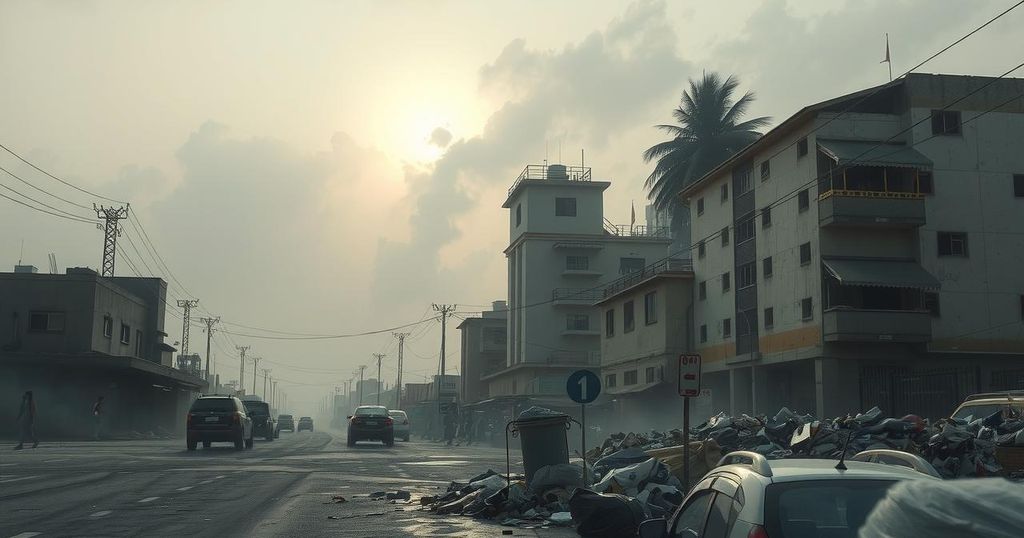Ghana, Nigeria, Chad, Rwanda Among the Top Polluted Countries in the World: 2024 Report

The 2024 World Air Quality Report highlights the critical pollution levels in Ghana, Nigeria, Chad, and Rwanda, marking them among the most polluted countries globally. PM2.5 concentrations significantly exceed WHO guidelines, contributing to a public health crisis. Ghana has seen a drastic rise in pollution levels over the years, and urgent action is required to tackle air quality issues.
The 2024 World Air Quality Report identifies alarming pollution levels in several African nations, particularly Ghana, Nigeria, Chad, and Rwanda. These countries rank among the most polluted globally, indicating a severe air quality crisis jeopardizing millions of lives across the continent.
Chad leads the world with a staggering PM2.5 concentration of 91.8 µg/m³, which is nearly 18 times the World Health Organization (WHO) guideline of 5 µg/m³. Nigeria and Rwanda also feature prominently, with PM2.5 levels of 40.1 µg/m³ and 40.8 µg/m³ respectively. Ghana ranks 14th with 35.8 µg/m³, underscoring a concerning trend in deteriorating air quality.
PM2.5 particles are highly dangerous, penetrating deep into the lungs and bloodstream, leading to serious health issues such as respiratory and cardiovascular diseases. They are notably smaller than dust particles and human hair, making them particularly hazardous.
Data from the University of Chicago’s Air Quality Life Index indicates that air pollution is expected to shorten lifespans by an average of 2.7 years in heavily polluted areas. In Ghana, it has been estimated that 28,000 people die annually due to air pollution, and globally, these pollutants contribute to 8.1 million deaths each year.
Ghana’s air pollution continues to rise, with current levels recorded at seven times higher than the WHO’s safe limit. The capital city, Accra, was listed as the 16th most polluted worldwide, but Kumasi has overtaken it as Ghana’s most polluted city with a PM2.5 level of 39.5 µg/m³.
Ghana’s pollution levels have dramatically increased over the years, moving from the 27th position in 2022 to 14th in 2024. The steady rise from previous years indicates urgent attention is required to reverse this trend.
The report reveals stark realities for Africa, with five of the top ten most polluted countries located on the continent. However, only 24 out of 54 African nations reported air quality data, highlighting a significant lack of monitoring infrastructure.
In Ghana, the air pollution crisis represents a public health emergency. With the current trajectory, thousands more are expected to succumb to pollution-related health issues if measures are not implemented soon. Moreover, without intervention, the economic consequences of air pollution could reach $137.8 billion by 2040.
The global context contrasts starkly, with only seven countries achieving WHO’s PM2.5 guidelines. Some nations, like Australia and New Zealand, maintain cleaner air quality, while many urban areas in Africa struggle to monitor pollution effectively.
Key factors driving air pollution in Africa include rapid urbanization, population growth, and industrial emissions. The increasing reliance on non-governmental organizations for air quality data underscores the necessity for governmental action in this critical area.
As Ghana faces increasing environmental challenges, the government’s commitment to enforcing stricter regulations and adopting renewable energy solutions is crucial. Public health experts advocate for stronger vehicle emission standards, improved air quality monitoring, and initiatives to combat pollution effectively. Immediate action is imperative to safeguard the health of citizens and manage this escalating crisis.
The findings from the 2024 World Air Quality Report are alarming, particularly for countries like Ghana, Nigeria, Chad, and Rwanda which rank among the world’s most polluted. The data reveals a dire need for urgent environmental reforms and public health strategies to mitigate the health impacts of air pollution. Immediate governmental action is necessary to address this escalating crisis, as failure to do so will have dire consequences for both public health and economic stability in these nations.
Original Source: www.myjoyonline.com








